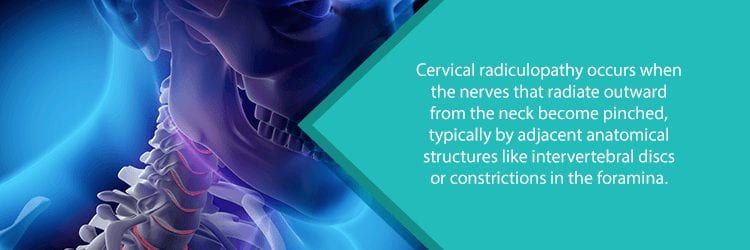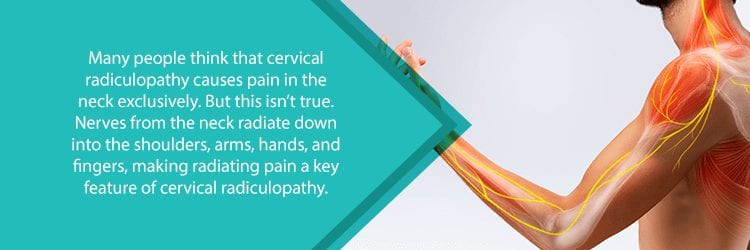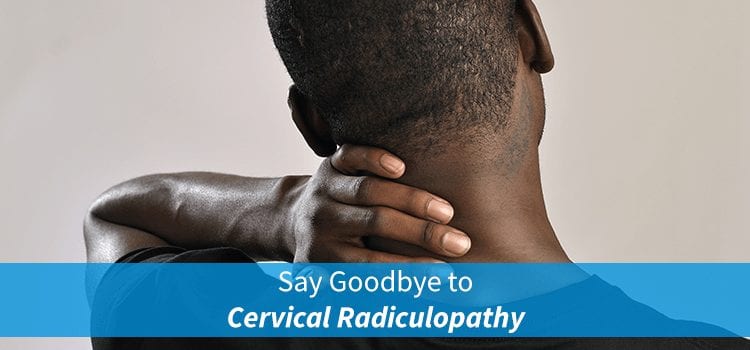Are you bothered by neck pain that radiates down your arm? Do certain neck movements make your pain worse? Or, maybe you’re worried about that “pins and needles” sensation in your shoulder, arm, or hand?
If so, then you may be dealing with cervical radiculopathy. This neurological condition can be caused by changes in the spine resulting from aging, injury, or damaged discs.
You’re probably wondering what can be done for cervical radiculopathy. Is surgery necessary? Can conservative treatments actually help?
There’s plenty of good news.
Cervical radiculopathy treatment may not require surgery. Allowing your body time to heal and using proven, conservative treatments may be all you need. This, of course, depends on the underlying cause of your neck pain and the severity of your symptoms.
NJ Spine and Ortho is here to help you take a closer look at why you may be experiencing these symptoms.

Causes of Cervical Radiculopathy
Your brain is the hub of your central nervous system. It relays messages throughout your body with the help of the spinal cord and a network of nerves. Consider your neck (i.e. the cervical spine) to be the bridge between your brain and the rest of your body.
A column of seven vertebrae originates at the base of the skull and connects to the thoracic spine (or upper back) area. Your cervical spine serves to protect the spinal cord and also supports the head. In addition, nerve roots branch out from these vertebrae through openings known as foramina. Between each of these vertebrae, flexible discs reside, absorbing the shock of our everyday movements.
How do all of these complex structures contribute to your radiculopathy pain?
The short answer is: it depends.
Cervical radiculopathy is caused by a compressed or irritated nerve. Sometimes, considered a “pinched” nerve, this compression usually occurs where a nerve root branches out from the spinal column. Structural changes affecting the spine can injure a nerve and cause radiating pain as well as other issues.
Common causes of structural nerve compression include:
- Degenerative changes in the spine: As we age, the spine changes because of wear and tear, personal habits, and disease. Sometimes, the discs protecting the spine can lose their shape and structure. Also, osteoarthritis can cause bone spurs to grow in or around the foramina. Foraminal stenosis is a blanket term for changes in the cervical spine that involve narrowing of the foramina. It is the most common cause of cervical radiculopathy.
- Herniated disc: Sometimes, the inner layer of a disc can rupture and push through its tough outer layer. It can be due to repeated, strenuous activity, a car accident, or other trauma. The damaged disc can then press against a nerve causing radiculopathy.
- Less common causes: Fractures to the spine—such as spondylolisthesis—tumors, or infections may also injure the nerves exiting the spinal cord.
Cervical Radiculopathy Symptoms
Neck pain can result from a variety of factors. Cervical radiculopathy, however, has some tell-tale symptoms. These often depend on the particular nerve root which is affected.
Here’s what you need to look out for:
- Varying levels of pain, starting at the neck and radiating into the shoulders, arms, hands, or fingers. Pain may be dull and aching or a sharp and burning.
- Numbness or reduced sensation in the neck, arm, and fingers. Sometimes, this can be experienced as a “pins and needles” sensation.
- Muscle weakness or reduced coordination in the arms or hands.
- Changes in how you respond to hot and cold stimuli.
- Changes in your reflexes when your doctor uses a rubber mallet
- Your pain decreases when hands are placed on the top of the head.
In general, these symptoms typically occur on only one side of the body. There are times, however, when both sides may be affected.

What is the Best Treatment for Cervical Radiculopathy?
You want relief from your radiculopathy symptoms. You want to stop worrying if things will continue to get worse. But, most importantly, you want to know how to reverse your condition. Some home remedies are effective for symptom management. In fact, many nonsurgical treatments can even address the underlying cause.
Of course, this all depends on the severity of your condition and how the individual nerves are affected.
What’s the best thing you could do?
Get checked out by your physician or an orthopedic doctor. Diagnosing the problem is fairly straightforward. Your doctor will conduct a physical exam and gather information about your medical history. In some cases, imaging and electrodiagnostic testing may be ordered to confirm a cervical radiculopathy diagnosis.
Is it worth the time and money for an accurate diagnosis?
Definitely, it is!
Take this example: a person with carpal tunnel syndrome may be scouring the web, looking for an accurate diagnosis. Since some of the symptoms of carpal tunnel syndrome are similar to cervical radiculopathy, one may misdiagnose his or her condition. Instead of taking steps to improve the condition, the individual then works hard to treat a condition that he or she doesn’t have.
Don’t waste any more time: contact a doctor, confirm your condition, and start the healing process today!
Cervical Radiculopathy Home Remedies
Home remedies may not address the underlying cause of your cervical radiculopathy. These treatments can, however, provide symptom relief and hasten your recovery process.
Here are some things you could try to soothe a pinched nerve in the neck:
- Resting and/or activity modification: Limiting strenuous activities or heavy lifting can allow your body time to heal. In addition, paying better attention to your posture while sitting, walking, and performing everyday activities may put less strain on your neck.
- Ice and/or heat therapy: If you experience pain or other symptoms after performing tasks, you may want to apply a cold pack to soothe the area. Heat can also be effective in speeding up the healing process and in reducing inflammation. Try to use ice or heat for up to 20 minutes a session. Then, wait a couple of hours before repeating.
- Over-the-counter medications: Nonsteroidal anti-inflammatory drugs (NSAIDs) like aspirin or ibuprofen can relieve pain and reduce inflammation. Consider trying these medications before moving on to more powerful (and potentially more addictive) prescription drugs.
- Cervical radiculopathy exercises: There are some easy exercises you can do every day to strengthen the neck and restore movement. While it is certainly easy to find these exercises on the web, you want to check with your physician before starting any new exercise routine. This is especially true if you recently suffered an accident or have worsening weakness/numbness in the arm.
What if these home remedies don’t work? Don’t worry: Other non-surgical treatments may help!

Looking Beyond Home Remedies for Relief
Sometimes you need the help of a professional to treat your cervical radiculopathy symptoms. Here are a couple of useful options:
- Physical therapy: A physical therapist can assess your condition and prescribe strengthening and stretching exercises based on your individual needs. Also, the physical therapist may suggest cervical traction or a soft cervical collar to improve your posture and soothe inflammation.
- Chiropractic care: A chiropractor or other health professional can manually adjust the cervical spine. Manual manipulation can improve mobility, reduce symptoms, and create a better healing environment.
- Prescribed medications: Sometimes, over-the-counter medications don’t provide sufficient relief. A doctor may prescribe muscle relaxants or stronger pain medications if your pain limits you from completing everyday activities. Always make sure you take these medications as directed. Some drugs may be habit-forming, especially if you have a history of substance abuse.
- Cervical epidural steroid injection: A doctor may choose to inject steroids near the affected nerve to reduce inflammation. Steroid injections do not treat the cause of the problem. They do, however, lessen the swelling and pain to allow the nerve a chance to heal.
When Should Surgery Be Considered?
If your symptoms haven’t improved after 2 to 3 months of conservative treatment, you may want to consider consulting with an orthopedic surgeon.
Sound scary?
Surgery may not be as bad as you think.
Many surgical procedures for cervical radiculopathy employ minimally invasive techniques that improve surgical outcomes. What does this mean for you? Less damage to surrounding tissues, minimal scarring, and quicker recovery times. During spinal decompression, a surgeon uses a tiny camera and surgical tools to access the area and create more space for the nerve roots. If you experience arm pain or numbness, minimally invasive neck surgery boasts a success rate between 80 and 90 percent.
What happens during cervical radiculopathy surgery? It depends on your particular condition. In some cases, the surgeon may remove the damaged intervertebral disc and fuse the affected vertebrae with a bone graft and other instrumentation. Sometimes, a surgeon replaces a damaged disc with an artificial one. This allows for more mobility than one would experience with typical fusion surgery.
Another surgery used for a pinched nerve in the neck is a posterior cervical foraminotomy. In a nutshell, this procedure makes more room for the pinched nerve to pass through the foramen. Using a small incision in the back of the neck, precision instruments carefully remove pieces of bone that may be compressing the nerve.
Physical therapy and other rehabilitation may be necessary after surgery to achieve a full recovery.
Ready to Feel Relief?
You don’t want to be in pain anymore. Why not schedule a consultation with experienced professionals who know how to fix cervical radiculopathy?
NJ Spine & Orthopedic uses the latest technology and proven treatments to help you get your life back. We won’t pressure you for surgery. In fact, we want to make sure that you know all the conservative treatment options out there.
If surgery is your best option, however, you have the comfort of knowing that our team has decades of experience in treating a variety of simple and complicated spinal conditions.
Call our pinched nerve doctors at (855) 586-2615 today to set up an appointment!

